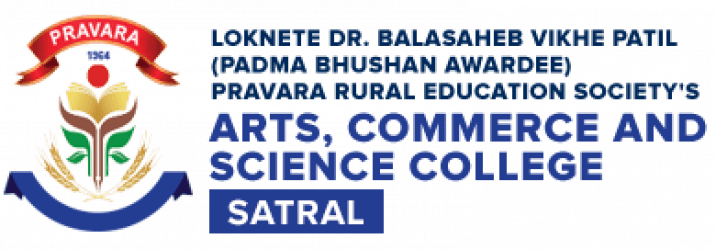Quick Links
Syllabus
Results
ResultsStudent Satisfaction Survey
Student Satisfaction Survey 2018-19COMPETITIVE EXAMINATION CELL
(PRAVARA QUEST)
Establishment
Competitive Examination Cell (Pravara Quest) was established to guide the students in aspiring for competitive examinations in the college.Objectives
- To provide the students guidance about competitive examinations.
- To bring to the students renowned resource persons in order to impart specialized guidance.
- To create a conducive ambience in the college for competitive examination.
| Subject | Faculty |
|---|---|
| History | Mrs. L.H. Pandure |
| Geography | Dr. Wani B. K |
| Public Administration | Mr. Suryawanshi A.G |
| Economics | Mrs. Singar J.R |
| Environment | Dr. Wani B. K |
| General Science | Mr. Kanhe |
| Comprehension | Mr. Kedare A. N |
| Communication and interpersonal skills | Dr. Wadmare R. L |
| Reasoning and Analytical Ability | Mr. Kedare A. N |
| Decision making and problem solving | Mr. Ghane D. N |
| General mental ability | Miss. Salunke A. C |
| Basic Numeric | Miss. Salunke A. C |
| English language comprehension skills | Mr. Borude S N |
| Current Affairs | Mr. Ghane D. N |
EXAMINATION COMMITTEE
| Name | Designation |
|---|---|
| Dr. S.N Shingote | Chairman |
| Dr. G. R. Pandhare | Chief Examination Officer |
| B. B. Pulate | Exam in charge |
| Mr. V.G. Shinde | Member |
| Mrs. C.S. Karle | Member |
| Dr. N.A. Shinde | Member |
STUDENT CENTRIC METHODS
Students are considered as an important stakeholders of the institute. Our institute imparts education through student centric approach. The experiential learning, participative learning and problem solving methodologies are adopted for enhancing learning experiences. The academic process of planning, delivery of curriculum and assessment is student centric. Various efforts are made to make learning more students centric by focusing on specific learning outcomes for all courses and making it more participatory and interactive.
The student centric teaching is promoted by ensuring classroom environment to be learner-friendly. Emphasis is given on proper academic preparation and syllabus completion. Any doubts raised by learners are clarified by re-explaining the topic at a level where student can understand the topic more easily. Critical thinking of learners is developed by asking them questions related to topic during the lecture. Guest lectures by eminent experts are organized. Faculty performance is closely monitored through student feedback. Library facilities help students in self-learning process. The college forms various committees such as Career Guidance and Counselling Cell, Placement and Training Cell, Science Association, Commerce Association, Literary Association etc. to ensure student centric teaching-learning. To improve the quality of teaching-learning, the following activities are carried out:
- Experiential Learning: Project work, science exhibition, participation in seminar/workshop/conference, field and industrial visit, study tour and case study.
- Participative Learning: Class seminar, Group discussion, participation in debates, questioning method/quiz, debate and elocution and role play.
- Problem Solving: Critical thinking of learners is developed by asking them questions related to topic during the lecture. Research activities are carried out in PG department viz. Chemistry and Commerce.
ATTAINMENT OF POs, PSOs and COs
Introduction
The institute measures the levels of attainment of course outcomes, programme specific outcomes and programme outcomes. The teachers and students are oriented towards PO, CO and Curriculum. Emphasis is being given to skills, competencies and attitude along with communication skills apart from theory knowledge.
Aims and Objectives
- To inculcate the concept of Outcome Based Education amongst students and faculty by enriching the curriculum with well-defined POs and COs and its curricular mapping to emphasis learning outcomes and its evaluations during Internal Assessment by the faculty.
- To give emphasis to combine knowledge, skills, competencies, scientific temper, analytical ability, spirit of enquiry, research cult, communication skills, attitude and values ethics in curricular transactions and evaluations.
- To enhance the curriculum by offering Value added/Add on courses and encourage students to achieve overall academic excellence.
The course outcomes is measured through syllabus, completion of syllabus, continuous evaluation (internal evaluation), setting up of question paper, evaluation, and result. Teachers measure the course attainments in classroom interactions, question-answer session and personal counseling. Faculty takes efforts to complete the syllabus in time and conduct extra classes if necessary. The continuous evaluation is done through tests, quizzes, written assignments, oral presentations, field work and so on. Performance of students is observed through activities such as sports, cultural, debate, elocution, N.S.S. etc. Course outcome is also measured through awards and prizes won by the students. The programme specific outcomes is measured by taking the aggregate result of all courses in a given programme. The attainment of programme outcomes is measured through students progression to higher education. Attainment is also measured through students placement in companies and institutions. The feedback system of different stakeholders which is in place in the institute helps to measure the attainment of the programme outcomes. The online student feedback system provides information related to the relevance of the course, availability of the course material, and importance of courses in terms of employability. The institute has also utilized student satisfaction survey developed by NAAC.
